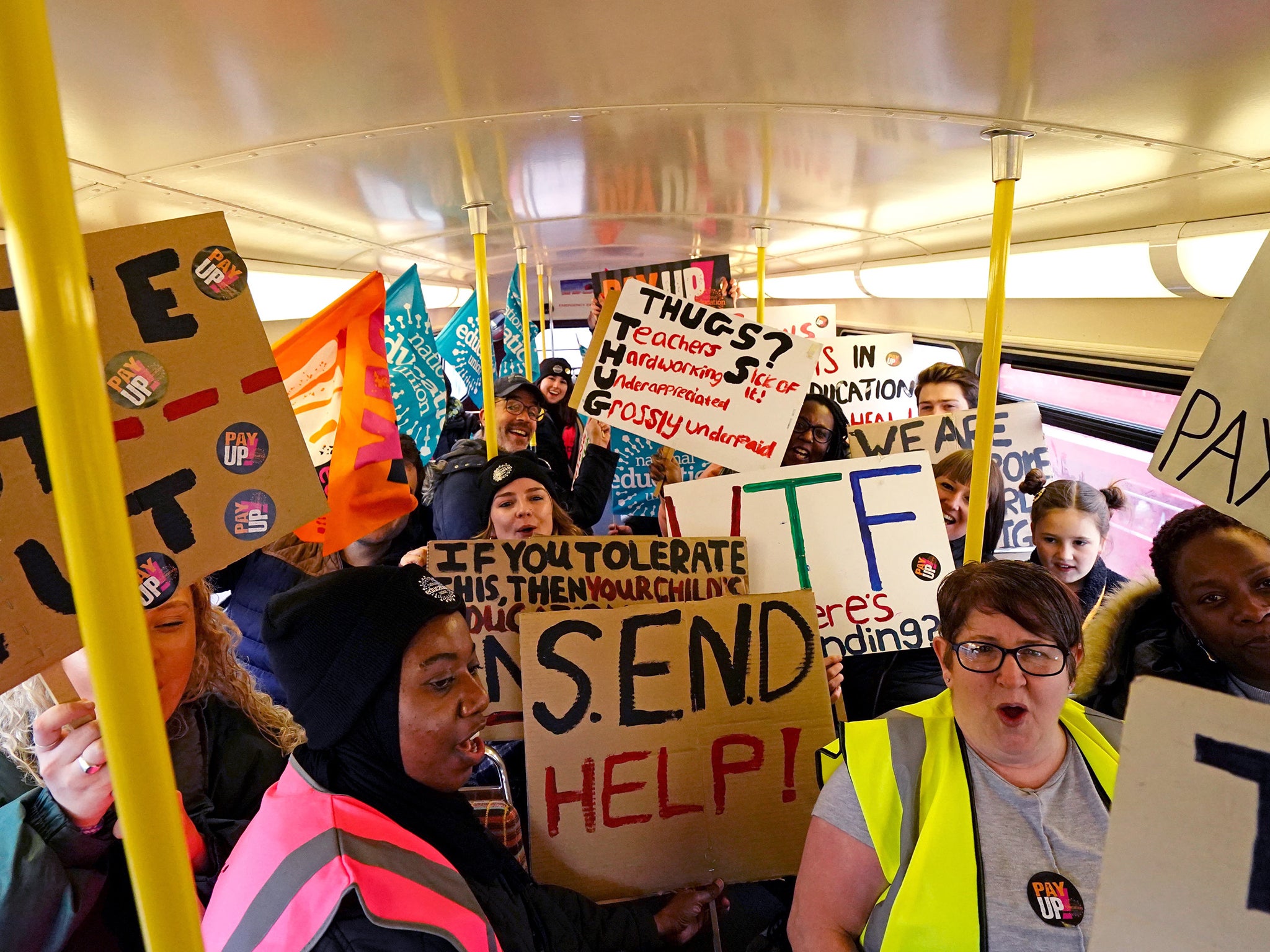Why are Britain’s teachers striking?
Educators forced to join picket lines to call for improved pay and working conditions
More than 100,000 teachers from 23,000 schools are striking in England and Wales on Wednesday, according to the National Education Union (NEU) – the biggest walkout in the profession since 1986.
Teachers belonging to the Educational Institute of Scotland (EIS) are also on the picket line in Aberdeen and Clackmannanshire, part of rolling regional demonstrations, as are around 70,000 staff from 150 universities, who will join University and College Union (UCU) demonstrations.
The industrial action will affect 85 per cent of schools to some degree, the NEU has said, although education secretary Gillian Keegan has insisted that “the majority” of institutions will remain at least partially open, adding that “some will have restrictions”.
Educators, like workers from many other sectors in recent months, have been moved to go on strike in pursuit of improved wages and less overwhelming working conditions in response to the cost of living crisis and the ever-increasing professional demands placed on them.
While most state school teachers in England and Wales were awarded a 5 per cent pay rise in 2022, teaching staff have argued that this amounts to a 5 per cent cut in practice given that UK inflation is at 10.5 per cent.
In Northern Ireland, most teachers were offered 3.2 per cent rises for the 2021/22 and 2022/23 school years while Scottish educators have rejected both a 5 per cent offer and a more recent 6.85 per cent proposal.
That follows the Institute for Fiscal Studies reporting that teachers’ salaries in England fell by around 11 per cent between 2010 and 2022, even before the rate of inflation is taken into account.
Dr Mary Bousted and Kevin Courtney, the joint general secretaries of the NEU, have said: “This is not about a pay rise but correcting historic real-terms pay cuts.
“Teachers have lost 23 per cent in real terms since 2010, and support staff 27 per cent over the same period. The average five per cent pay rise for teachers this year is some seven per cent behind inflation. In the midst of a cost of living crisis, that is an unsustainable situation.
“We regret having to take strike action, and are willing to enter into negotiations at any time, any place, but this situation cannot go on.”
A Department for Education spokesperson said: “There are no great schools without great teachers, which is why we are making the highest pay awards in a generation – five per cent for experienced teachers and more for those early in their careers, including an 8.9 per cent increase to starting salary.
“We are also investing an additional £2bn in schools next year and £2bn the year after, taking school funding to its highest ever level.
“After two years of disrupted education for young people, strike action is simply not a reasonable solution.”
Speaking to BBC Breakfast on Wednesday morning, Ms Keegan said that it “makes no sense to give inflation-busting pay rises to some of the workforce” when all are suffering.
That continues the strategy Rishi Sunak’s government has adopted of putting up a tough front in negotiations with unions while insisting the money is not available to grant the salary increases, given the country’s present economic plight.
Dr Bousted accused the government of failing to negotiate meaningfully with the NEU during an interview with BBC Radio 4’s Today programme, saying its conduct had left teachers “forced to stand up” at a time when some have been compelled to take second jobs to make ends meet, pointing out that one-third of new teachers now quit within five years because of the stress of the job.
The education secretary rejected this criticism, saying she had had five meetings with the union in recent weeks.
Groups representing parents have meanwhile released a joint statement in support of Wednesday’s action.
The release – signed by the parental organisations Save Our Schools, Rescue Our Schools, Let Our Kids Be Kids, Special Needs Jungle and Square Peg – makes clear that parents back teachers in their demand for “fair pay”.
The organisations say they share the concerns of teachers that children’s education is being harmed because of a lack of qualified teachers and turnover of staff and call on the government to engage with the NEU to negotiate a settlement and avoid further industrial action.
Mr Courtney said: “Taking strike action is very much a last resort for our members. They do so with a heavy heart because they cannot stand by and watch their pupils not receiving the education they deserve.
“Parents know from first-hand experience that children are losing out because of the chronic shortage of teachers. Often pupils are being taught by short-term supply, or staff who aren’t qualified in the subject they’re teaching.

“Knowing that parents and members of the community support them taking a stand to Save Our Schools will give educators huge confidence in taking this action, not just for fair pay, but in defence of children’s education.”
Ms Keegan has since told Times Radio that she was surprised to learn that teachers were not required to say in advance if they were planning to take part in the strike and said the legal position will remain “under review”.
“It was a surprise to some of us that [it] was in fact the law. I did write to everybody urging them to be constructive, to let their heads know, and I am sure many teachers will have done that," she said.
“There are discussions around minimum service levels, minimum safety levels, around hospitals, around rail – education is part of that Bill as well.
“We are hoping not to use that, we are hoping to make sure we continue with constructive discussions and relationships, but these things will always stay under review.”
With the war of words continuing, Dr Bousted told the Press Association on Wednesday that Ms Keegan sending a letter to headteachers reminding them not to pay striking staff had been “just ridiculous”.
“Gillian Keegan just seems to me to veer between saying she wants to negotiate and then playing politics,” she said.
“She sends letters to us on Saturday mornings or on Fridays at 4.55pm, or at the last minute… It’s just provocative… Does she think that headteachers don’t understand employment law? It’s just ridiculous.”
Speaking outside of Bishop Thomas Grant School in Streatham, south London, Dr Bousted also urged the government to “dial down the invective” and “remember that in the end we have got to come to a resolution of this dispute”.
She added, pointedly, that teachers will be “going back into school with views about this government” and that a general election is imminent.
Additional reporting by agencies
Join our commenting forum
Join thought-provoking conversations, follow other Independent readers and see their replies
Comments




Bookmark popover
Removed from bookmarks